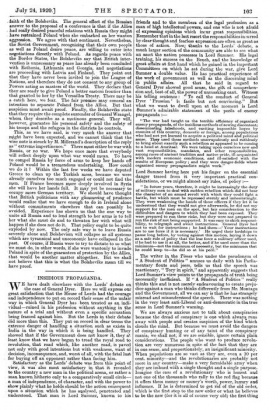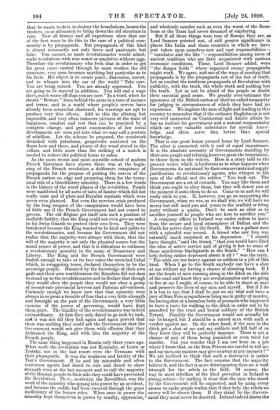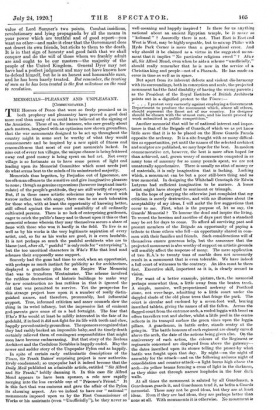- INSIDIOUS PROPAGANDA.
WE have dealt elsewhere with the Lords' debate on the case of General Dyer. Here we will express our great satisfaction that the House of Lords had the courage " and independence to put on record their sense of the unfair way in which General Dyer has been treated as an indi- vidual—ruined. in his profession without anything in the nature of a trial and without even a specific accusation being framed against him. But the Lords in their debate did more than this. They put on record in clear terms the extreme danger of handling a situation such as exists in India, in, the way in -which it is being handled. They showed that if the Government does not know it, they at least know that we have begun to tread the royal road to revolution, that road which, like another road, is paved not only with good intentions but With weakness, want of decision, inconsequence, and, worst of all, with the fatal lust for. buying off an opponent rather than facing him.
Satisfactory as the Lords' debate was from this point of view, it was also most satisfactory in that it revealed to the country a new man in the political arena, or rather a man known hitherto only to a comparatively small circle— a man of independence, of character, and with the power to show plainly what he holds should be the action consequent upon a situation which he has analysed, penetrated and understood. That man is Lord Sumner, known to his friends and to the members of the legal profession as a man of high intellectual powers, and one who is not afraid of expressing opinions which incur great responsibilities. Remember that in the last resort the responsibilities in3urred by clear thought and fearless expression are often as great as those of action. Now; thanks to the Lords' debate, a much larger section of the community are able to see what an asset the nation possesses in Lord Sumner. His legal training, his success on the Bench, and the knowledge of great affairs at first hand which he gained in the important Committees on which he sat during the war, give Lord Sumner a double value. He has practical experience of the work of government as well as the discerning mind in public affairs. All that he said in regard to General Dyer showed good sense, the gift of comprehen- sion and, best of all, the power of unmasking cant. Witness his telling sentence : " To call the conduct of General Dyer ' Prussian ' is facile but not convincing." But what we want to dwell upon at the moment is Lord Sumner's admirable statement of the perils of enemy propaganda :— " The war had taught us the terrible efficiency of organized enemy propaganda, of the insidious methods of sowing discontent; disseminating falsehoods, and exciting impossible hopes by enemies of this country, domestic or foreign, among populations who had not yet learned to acquire a political mind and political sense. They used these methods unscrupulously and ruthlessly to bring about exactly such a rebellion as appeared to be coming to a head at Amritsar. We were taking upon ourselves new and vast responsibilities, mandates, and other responsibilities, among races of ancient tradition and native pride, ill-acquainted with modem economic conditions, and ill-satisfied with the
• results of European policy ; and they were danger-fields where organized enemy propagandists might work."
Lord Sumner having here put his finger on the essential danger traced from it very important practical con- siderations, or we.might almost say rides, of policy :— "In future years, therefore, it might be increasingly the duty of military men to deal with sudden rebellion which did not bear the character of an armed revolt with which they could fight a battle, but which must be repressed sternly and unhesitatingly. They were weakening the hands of these officers if they let it be understood that they would not give afterwards, he did not say support for the men on the spot, but fair consideration to the difficulties and dangers to which they had been exposed. They were prepared to run these risks, but they were not prepared to run the risk of not being supported. It was easy to shirk responsi- bility, to telegraph and await instructions. General Dyer had not to wait for instructions ; he had them—' Your instructions are to use force if it is necessary.' He urged their lordships to pause long before, by voting against this motion, laying it down as a safe rule of policy that the less force a military officer used, if he had to use it at all, the better, and if he used more than the minimum—not the minimum of necessity, but the minimum that he could keep to—be did so at his peril."
The writer in the Times who under the pseudonym et "A Student of Politics" amuses us daily with his Parlia- mentary flouts and jeers, tells us that the speech was reactionary, "Tory in spirit," and apparently suggests that Lord Sumner's view points to the propaganda of truth being • necessarily inefficient. If "A Student of Politics" really thinks this and. is not merely endeavouring to create preju- dice against a man who thinks differently from Mr. Montagu and the Government, all we can say is that he has strangely misread and misunderstood the speech. There was nothing in the very least anti-Liberal or anti-democratic in the true sense in Lord Sumner's warning.
We are always anxious not to talk about conspiracies • because the dread of conspiracy is one which always, runs away with people and. creates suspicion of the kind which clouds the mind. But because we must avoid the dangers of conspiracy hunting or of any taint of the conspiracy mania; we shall not; if we are sensible, ignore certain plain considerations. The people who want to produce revolu- tion are very numerous in spite. of the fact that they are in one sense, and proportionately, an insignificant minority. When populations are so vast as they are, even a 10 per cent. minority—and the revolutionaries are probably not more in any country—make a very formidable army when they are imbued with a single thought and a single purpose. Imagine the case of a revolutionary who is honest and not one of the thousands who rally to the red flag because it offers them money or money's worth, power, luxury and influence. If he. is determined to get rid of the old order, which is the first step to the new order or what he believes to be the new (for it is all of course very old) the first thing that he wants to do is to destroy the foundations, loosen the timbers, so as ultimately to bring down the old structure in ruin. Now all history and all experience show that one of the best ways to do this in the case of a political com- munity is by propaganda. But propaganda of this kind is almost necessarily not only fierce and passionate but false. You cannot, as most revolutionaries would admit, make revolutions with rose water or omelettes without eggs. Therefore the revolutionary who feels that in order to get his great cause carried through he must weaken the old structure, very soon becomes anything but particular as to his facts. His object is to create panic, dissension, unrest, and to whisper into the ear of the world "Take care. You are being ruined. You are already oppressed. You are going to be starved in addition. You will end a wage slave, much worse off than you are now." In a word, when he shouts" Beware "from behind the arras in a tone of menace and terror, and in a world where people's nerves have already been somewhat shattered, his warnings are apt to produce very dire effects. Add to this the alluring but impossible and very often insincere pictures of the state of happiness, comfort and rest that can be procured by a complete change, and great communities of low social development are soon put into what we may call a posture of rebellion. Let the scheme be prepared, the woodwork drenched with petroleum, gunpowder scattered on the floors here and there, and plenty of dry wood stored in the cellars, and little more than the striking of a match is needed to reduce the political house to ashes.
As the most recent and most scientific school of modern French historians have shown there was at the begin- ning of the French revolution a deliberate conspiracy of propaganda for the purpose of putting the nerves of the French nation on edge and preparing them for the tyran- nical rule of a bloodthirsty minority. There in a few words is the history of the worst phases of the revolution. People were maddened by all sorts of tales of famine which did not really exist and of plots and Royalist reprisals which were never even planned. But even the nervous crisis produced by the long tongues of the conspirators would have been of little use if the French Government had not ceased to govern. The old Regime got itself into such a position of ineffable futility, that the King could not even give an order to his Swiss Guards to protect their own lives. They were butchered because the King wanted to be kind and polite to the revolutionaries, and because his Government did not realize that the majority were always with them, that the will of the majority is not only the physical source but the moral source of power, and that it is ridiculous to enthrone a revolutionary minority in the name of Democracy and Liberty. The King and the French Government were foolish enough to take at its face Value the wretched. Cabal which, in swaggering tones, declared themselves to be the sovereign people. Haunted by the knowledge of their own guilt and their own worthlessness the Royalists did not dare to stand up to the revolutionaries and to declare that though they would obey the people they would not obey a group of second-rate provincial lawyers and Parisian adventurers. Curiously enough we know now that that minority were always in so great a tremble of fear that a very little strength and foresight on the part of the Government, a very little exercise of the power of governing, would have kept them quiet. The timidity of the revolutionaries was indeed extraordinary. At first they only dared to go inch by inch, and it was not till they had again and again proved that there was nothing they could ask the Government that the Government would. not give them with effusion that they dethroned the King, and with him the majority of the French people.
The same thing happened in Russia only three years ago. What made the revolution was not Kerensky, or Lenin or Trotsky, nor in the last resort even the Germans with their propaganda. It was the weakness and fatuity of the Tsar's Government. If he and his miserable and often traitorous agents had dared to rule and dared to show strength even at the last moment and to call the majority of the Russian people to their side they could have prevented the Revolution. Thr,r, as always, the Revoliction was the work of the minority who sprang into power by an accident, a. nd because the saddle had been vacated through the gross inefficiency of the former rider. When once in power the minority kept themselves in power by cruelty, oppression, and wholesale murder such as even the worst of the Bour- bons or the Tsars had never dreamed of employing.
But if all these things were true of Europe they are, as Lord Sumner pointed out, of still greater significance in places like India and those countries in which we have just taken upon ourselves new and vast responsibilities-- " mandates and the like "—responsibilities among races of ancient tradition who are little acquainted with modern economic conditions. These, Lord Sumner added, were "the danger fields" where organized enemy propaganda might work. We agree, and one of the ways of meeting that propaganda is by the propaganda not of lies but of truth. Let us combat the insidious propaganda of Revolution with publicity, with the truth, the whole truth and nothing but the truth. Let us not be afraid of the people or doubt their essential good sense. We greatly over-estimate the ignorance of the British nation or their so-called incapacity for judging in circumstances of which they have had no experience. We implore the men of light and leading in this country to remember that if the ordinary Englishman is not very well instructed on 'Continental and Asiatic affairs he has an instinct for government and a natural magnanimity which are very valuable substitutes for special know- ledge and often serve him better than special knowledge. That is one great lesson pressed home by Lord Sumner. The other is connected with it and of equal importance. It is the absolute necessity of Governments standing by their own people and refusing,however great the temptation, to throw them to the wolves. Here is a story told to the present writer which is luciferous as to what happens when Governments do not stand by their own servants and supply justification to revolutionary agents, who whisper in the ears of the official and the soldier "You look out. The Government are a set of cowards. You may like them and think you ought to obey them, but they will desert you at the moment it suits them to do so. Come to in and we will really stick to you. If, however, you go on supporting the Government, when we win, as we shall win, we will have no mercy but will send you and yours to the scaffold or firing party without a qualm. Don't be such an idiot as to sacrifice yourself to people who are here to sacrifice you." A company officer in Ireland was under orders to move from the secure and loyal atmosphere of Belfast and the North for active duty in the South. He was a gallant man with a splendid war record. A friend who saw him was naturally much surprised at his depression. "I should have thought," said the friend, "that you would have liked the idea of active service and of giving it hot to some of those murderous blackguards in the South." "How can I help feeling rather depressed about it all ? " was the reply. "The odds are too heavy against us soldiers in a job of this kind. When I go to the South anybody can have a shot at me without my having a chance of shooting back. If I see the heads of men running along in the ditch on the side of the road and know they are revolutionaries and are going to fire at me I ought, of course, to be able to shoot at once and preserve the lives of my men and myself. But if I do it is ten to one that I shall be put on my trial and have a jury of Sinn Fein sympathisers bring me in guilty of murder, for having shot at a harmless body of peasants who happened to have a taste for walking in the ditch in order not to be assaulted by the cruel and. brutal soldiery of the British Tyrant. Possibly the Government would not actually let me be hanged, but I should be a ruined M,111 with such a verdict against me. On the other hand, if the men in the ditch get a shot at me and my soldiers and kill half of us they know they will be perfectly immune. There is not a chance of any of them being punished or even tried for murder. Can you wonder that I am not keen on a job where I know that, as the Sinn Feiners are careful to tell 133,3 and my men, our masters may give us away at any moment ? " We are inclined to think that such a statement is unfair to the Government. The fact remains that the majority believe it, and the fact is more disintegrating than an actual triumph for the rebels in the field. Of course, the way to meet rebellion of the kind prevalent in Ireland is strong action—by making it clear that the men who stand by the Government will be supported, and by using every means to make people realize that if they help the rebels no mercy will be shown them. If they stand by the Govern- ment they must never be deserted. Ireland indeed shows tha value of Lord Sumner's two points, Combat insidious, revolutionary and lying propaganda by all the means in your power which are truthful and of good report—you want no other—and make it clear that the Government does not desert its own friends, but sticks to them to the death. It is in that sign of honesty and good faith that we shall conquer and do the will of those whom we frankly admit are and ought to be our masters—the majority of the people of the United Kingdom. General Dyer may not have had a perfect judgment and may not have known how to defend himself, but he is an honest and honourable man, and he has been basely treated. But remember, the treating of men as he has been, treated is the first milestone on the road to revolution.




































 Previous page
Previous page